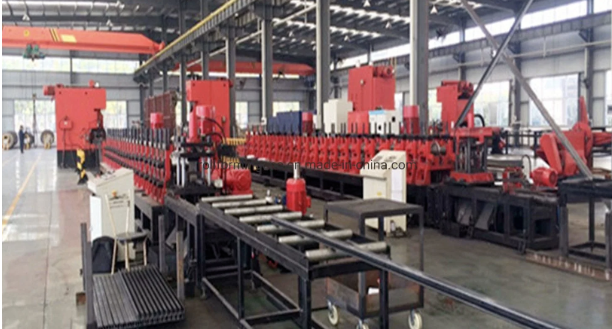
Posted on Monday, September 30, 2024
Roll forming machines are highly versatile equipment used to shape metal sheets into specific profiles by passing them through a series of rollers. They play a critical role in a wide range of industries, from construction to automotive and beyond. Below is a comprehensive guide to the various types of roll forming machines and their specific applications:
Purpose: These machines are used to produce metal roofing panels that are commonly used in both commercial and residential construction.
Common Profiles: Snaplock standing seam panels, PBR panels, corrugated sheets, and trapezoidal panels.
Key Applications: Metal roofing is prized for its durability, energy efficiency, and fire resistance, making these machines crucial for producing long-lasting, weather-resistant roofing solutions.
Purpose: Roll forming machines for siding are used to produce metal panels that are installed on building exteriors.
Common Profiles: Lap siding, vertical panels, and horizontal panels.
Key Applications: These machines help manufacture durable, aesthetically pleasing metal siding options that protect structures from environmental factors like wind, rain, and UV rays.
Purpose: Purlin machines are designed to produce structural components such as C and Z purlins, which are essential for the construction of metal buildings.
Common Profiles: C Purlins, Z Purlins, U Purlins.
Key Applications: Purlins are critical support structures in metal buildings, providing the framework for roofing and siding panels in commercial and industrial construction.
Purpose: These machines create steel decking used in multi-story buildings, bridges, and other large-scale construction projects.
Common Profiles: B Decking, metal decking, composite decking.
Key Applications: Steel decking provides structural support and acts as a base for concrete floors, contributing to the strength and stability of the overall building.
Purpose: Gutter machines are designed to produce seamless metal gutters, often customized to meet the specific needs of a project.
Common Profiles: K-style gutters, box gutters, half-round gutters.
Key Applications: Gutters are crucial for water management systems, helping to divert rainwater away from building foundations and preventing structural damage.
Purpose: These machines produce metal flashing used to seal joints in roofing and siding, preventing water infiltration.
Common Profiles: Step flashing, drip edge flashing, valley flashing.
Key Applications: Flashing is vital in protecting buildings from leaks by sealing vulnerable areas such as roof valleys, chimneys, and skylights.
Purpose: Structural roll formers produce heavy-duty metal profiles for load-bearing applications in construction projects.
Common Profiles: Beams, studs, channels.
Key Applications: Used in the construction of metal frameworks for buildings, bridges, and other structures, these profiles provide the necessary strength and stability for large-scale projects.
Purpose: These machines produce round, square, and rectangular metal tubes and pipes used in various industries.
Common Profiles: Circular pipes, square tubes, rectangular tubes.
Key Applications: Roll-formed pipes and tubes are used in infrastructure, automotive components, and HVAC systems, playing a vital role in fluid transport, structural support, and ventilation.
Purpose: These machines produce metal profiles for roller shutters, which are used in commercial and industrial buildings for security and privacy.
Common Profiles: Roller shutters, security doors.
Key Applications: Roller shutters provide a secure, durable option for doors and windows, commonly used in warehouses, storefronts, and garages.
Purpose: Silo machines manufacture metal profiles that are used to build agricultural and industrial silos for storing grain, feed, and other materials.
Common Profiles: Corrugated sheets, smooth-walled panels.
Key Applications: Silos require precise metal profiles to ensure strength, durability, and the ability to withstand environmental conditions, which is why roll forming is an ideal method for their production.
Purpose: These machines produce the metal profiles required for pergola structures and patio covers, offering weather-resistant solutions for outdoor spaces.
Common Profiles: Posts, beams, rafters.
Key Applications: Metal pergolas and patio covers are popular in residential and commercial projects for their durability and low maintenance.
Purpose: Custom roll formers are designed to produce unique metal profiles that are tailored to specific applications or industries.
Key Applications: Used across various sectors, custom roll forming machines provide flexibility for manufacturers who need specific shapes, dimensions, or materials that standard machines cannot produce.
Roll forming machines offer tailored solutions for a wide range of applications, from simple metal roofing panels to complex structural components. Whether you're in the construction, automotive, or agricultural industry, there's likely a roll forming machine that can meet your production needs, delivering precision, efficiency, and quality.
By understanding the different types of roll forming machines and their applications, businesses can invest in the right technology to stay competitive in their respective markets.

Used Purlin Roll Forming Machines for Sale Worldwide
Posted on Sunday, January 25, 2026
Pre-Owned Roll Forming Machines for Purlin & Structural Steel Profiles

Used Roof Panel Roll Forming Machines for Sale Worldwide
Posted on Sunday, January 25, 2026
Pre-Owned Roll Forming Machines for Roofing Panel Production

Used Roll Forming Machines for Sale Worldwide
Posted on Tuesday, January 20, 2026
Pre-Owned Roll Forming Machines with Inspection, Verification & Global Support

Steel Coil Supply for Roll Forming Machines Worldwide
Posted on Tuesday, January 20, 2026
Reliable Steel Coil Supply for Roll Forming, Fabrication & Manufacturing Applications
Copyright 2026 © Machine Matcher.